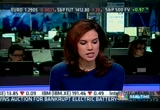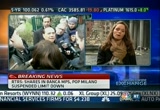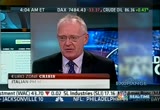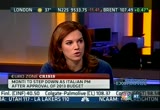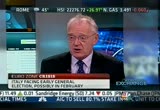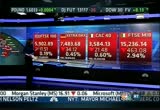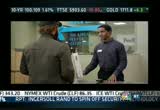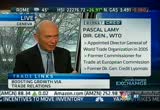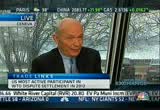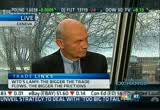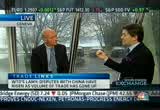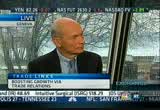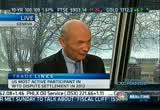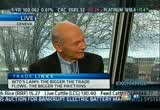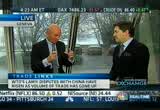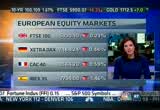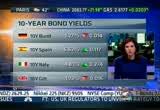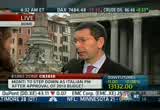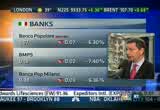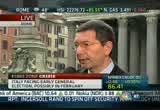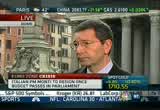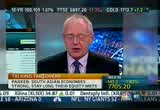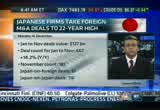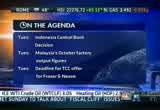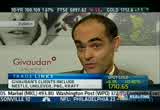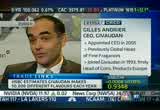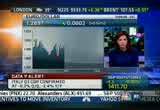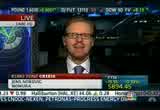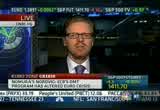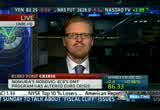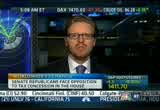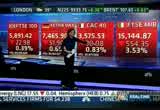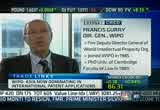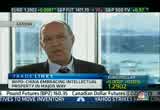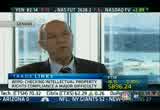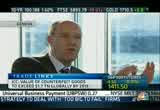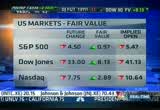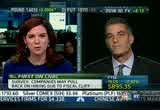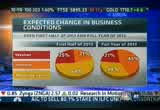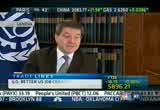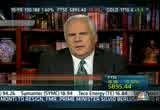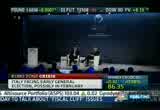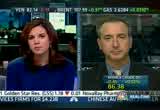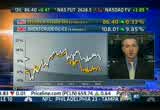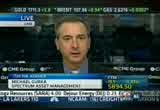tv Worldwide Exchange CNBC December 10, 2012 4:00am-6:00am EST
4:00 am
welcome to "worldwide exchange." ross westgate is away. i'm kelly evans and these are your headlines from around the world. political turmoil in italy sending european stocks lower. italian banks leading the way down as mario monte keeps investors guessing in whether he'll run against sylvia berlusconi next year. the unexpected drop signals
4:01 am
continued pressure from abroad. and meeting face-to-face, president obama and house speaker john boehner sit down for a one-on-one over the weekend. there are just three weeks left before the u.s. goes over the fiscal cliff. italian shares are down nearly 3% this morning. for the most part, it is bank stocks leading the way down. we're now down about 2.76% on the ftse mib. bank stocks have been hit particularly hard this morning. earlier, we saw shares down 5.6%. we're seeing the same thing, whether it's bmps hitting session lows down nearly 6% comes amid concerns about
4:02 am
leadership and economic reform in italy following mario monte's announcement that he'll resign once the budget has been passed. this move is likely to bring the country forward to elections next year. the italian prime minister has offered no clue as to whether or not he will run and it comes after sylvia berlusconi declared over the weekend he would throw his hat in the ring for the job of premier. carolyn ross is in italy following the details there. can you walk us through the time frame here? when are we expected monte to step down? what happens next? >> good morning to you, kelly. here is the time frame for you. over the next few weeks, we're expecting the budget stability law to be passed. neither of the political parties will want to be blamed for bringing down the stability of italy, so they will pass that over the next week. once that is passed, mr. mon at
4:03 am
the said he would step down. that will happen likely around new year's. and then the president will have to dissolve the parliament and between 45 and 70 days after the parliament is dissolved, new elections will take place and that probably takes us to february 2014. and, kelly, that is two months before the actual election day should have taken place previously. now, that's two months earlier. we knew that mr. monti, the technocrat prime minister was going to step down. his days were numbered, anyway. so this is just a change of the time frame. it's not a huge surprises in itself. the only surprise is the timing. markets are selling down somewhat this morning. banking stocks. but some of the economists we talked to here, they say, yes, we may see some volatility in the short-term, specifically over the next two months of campaigning because a lot of horse trading will be taking place, a lot of statements will
4:04 am
be made which may rattle the markets, but the crux of the matter is this. if you look at opinion polls right now, as a democratic party under berlusconi, he will likely win this election. current opinion polls suggest that he will walk away with around 30%. berlusconi's party, anti-austerity, anti-german, would only walk around with around 16% of the votes. so that 16% gap will be very, very difficult to be made up just over the next two months. so that's why many people say that the earlier election date is actually positive for the euro and for the continued reform push. obviously, the market is concerned that the new government under bersoni would not continue to implement the austerity measures, but he has reassured the market and everyone in the world, i will continue with these reforms and honor the commitments by the eu. we will have a balanced budget
4:05 am
in to 13. kelly. >> carolin, back with you later in the program. for now, we're joined by bob parker on set, senior adviser at credit suisse. bob, welcome. >> thank you. >> what do you make of this? is there any way that this is a positive in terms of perhaps opening the door towards mon at the monte serving in some sort of government? >>. >> i am assuming we're going to have a election probably in the second half of january. we're talking about a position of somewhere between 12 and 17% of the vote. so subsequently, i think fears that berlusconi may come back seem to be misplaced. i think if everyone looks at the last year and a half of what the monte government has achieved in
4:06 am
italy, you have to be impressed. we have a strong budget climate surplus. the overall budget has come in dramatically. we've had well fare reform, pension reform. there's further work to be done on the competitiveness of italy. >> i can't tell you how much investors have been talking bullishly about italy. we know it's the eurozone's third biggest economy. obviously what happens in italy is important. they've been saying if anything the problem is its membership in the eurozone which continues to hamper what it otherwise -- what markets would otherwise be rewarding for in terms of progress. >> i think if we're going to get a surprise in 2013, i would argue it's going to be italy. whereas economies like spain -- >> good or bad surprise? >> no, a good surprise. whereas economies like spain, greece, portugal are likely to stay in recession for the whole year, i would argue there's a high probability that italy will come out of recession towards the end of the second quarter. >> and that seems to be the real
4:07 am
concern that is in the market today, whether the political upheaval, even the campaigning by berlusconi could undo some of that progress. >> i think the key point is will the reform programs that have been initiated by the monte government, will they stay intact? i think there's a reasonable chance, they've had a more than reasonable chance that that is the case. yes, it's not surprising, we have the sell off today. it's inest knowledge that as the campaigning builds up, investors will be nervous.. the move by investors back into italian bonds over the next few months, we could see some exits. but i think if we get a sensible election results, and i think we probably will, then the reform program will be intact and the new government will stick to the budget that is going to be passed in the next two weeks. >> maybe a buying opportunity there. i won't quite put the words in your mouth. sgling one shouldn't be that negative on italy. >> okay on. today sees the culmination of
4:08 am
our trade link season & with a series of special interviews and ross westgate joins us live now fromva. ross, you're almost here with me. at least we get to be together on screen. >> what's going on three weeks now. and we finally are working on the same day and i've gone away. don't take it personally. >> now, ross is at the wto headquarters in geneva. tell us what you've got prepared there. >> as we know, every monday we do trade links and this is our trade links day today from the wto. shortly, we'll be joined by director general of the wto. they've revised down their growth forecast and we've seen an increase in complaints. but interestingly enough, this is the first time this year that we've seen the number of trade openings outpace the number of trade restrictions. there's a lot of interesting things going on and the -- we're going to get into the value added of trade, as well.
4:09 am
yes, an ipad in china gets made and it's value point $50. but it's only about $20 of that that goes to china and the rest goes back to the u.s. we'll get into the dynamics of trade, as well, and how we measure it. we'll also be joined by the ilo director general, as well, guy rider. we'll hear from the head of the world intellectual property organization. so it's a big trade day here from geneva on "worldwide exchange." lots of great things to get into. and by the way, 157 members of the wto, shortly to be 158. kazakhstan today should get the approval, all 157 ambassadors are here. they will get approval later this afternoon. so an ever expanding membership base. >> kazakhstan being just the latest. plenty more from ross straight ahead on the program.
4:10 am
in the meantime, we want to check in our how markets are doing. so much attention on italy. in particular, you can see the message broadly speaking this morning is in negative, we're seeing about a four to one outpacing decliners versus vapsers here. the stoxx 600 is down abo about .37%. let's take a look across the trade. the ftse down .2%. the xetra dax is shedding about .5% this morning. ftse 100 is holding up better, down in the range of .2%. this follows a strong report friday that had boosted markets. we were expecting to come into the session with a positive attitude and that should underscore the extent to which we are seeing weakness. take a look at how investors are seeing the range there. we're seeing the rotation out of the periphery.
4:11 am
italian markets are just shy of 4.8%. spain, similarly seeing a bit of a sell-off. yields rising to 5.63%. yields are benefiting as a result. quick look at forex, the euro/dollar was weakening on the back of this news. now we're seeing it just a little bit higher above that 1.29 level, 1.2904 to be exact. over here, we're going to get into more in the program about the dollar/yen. but this is restreeting a little bit. the aussie dollar is a bit weaker this morning. for more on that and asian markets, we're joined now by li fi fishwen. >> thank you, kelly. most asian markets kicked off the week on a strong note. ending higher but over 1%.
4:12 am
those gains he'sed a little after the disappointing trade figures for november. and that's with unis in beijing coming up on this show. shares in hong kong hovering around a ten-month high. canada said yes do a $10 billion takeover. elsewhere, the nikkei finished just a touch hire. expect revised third quarter gdp showing the economy is back in recession. exporters lost ground after china's trade data, but retailing gained momentum after nomura raised its price target. in south korea, gainers were offset by ship builders. the kospi finished flat. india's sensex is on the move underperforming the region lower by .2%. back to you, kelly. >> thank you very much for that.
4:13 am
stick around, because strayed ahead on the program, china's new member trade data comes in far weaker than expected. is it a one off or does this threaten the mainland's economic progress? we'll have plenty more when we come back. i always wait until the last minute. can i still ship a gift in time for christmas? yeah, sure you can. great. where's your gift? uh... whew. [ male announcer ] break from the holiday stress. ship fedex express ecember 22nd for christmas delivery.
4:16 am
the next of wto trade disputes has tripled in the past year in a sign that countries are becoming increasingly protectionist. ross westgate has more for us on this story from geneva. hi, ross. >> hey, kelly, yes. 8 complaints in the year before and 25 complaints so far this year. but it doesn't necessarily mean protectionism is getting worse. because we've actually had more opening traders and more practice put in place. it's great to come to your home. >> my pleasure. welcome. >> thank you so much for having us. just explain what is going on in terms of here we are five years past the financial crisis. you've just released the report a month ago. we've got more complaints. and i would suggest to the average viewer that there are
4:17 am
greater problems with respective trade. is that necessarily the case? >> i think it's a bit more complex than that. when you look at the trade opening measures, what we've seen recent sli a reasonably good picture. although there has been more trade restrictive measures and trade opening measures, which is a signal that protectionist specials are there. we haven't had a big tsunami. there's been no outbreak of protectionism. so that is the good news, although were not out of the woods and in some countries are let's say more usual suspect than others. now, you're right, we've had a growing number of disputes. but i think this is explained by government who reasonably successfully resist protectionist pressures have to
4:18 am
show that there are things, again, unfair competitors. so it is a contradiction. it's the politics of that that they probably contained reasonably well protectionist specialists but because of social economic hardship, they have to show they're tough with our competitors and they go more to the wto system which in a way is fine. we will adjudicate the dispute. whether it's eight, ten, 20 doesn't really change our mode of operation. >> and most of the complaints, more of the complaints are lodged against the united states. the united states is also lodging more complaints than anybody else. is that because they happen to be the biggest economy in the world? >> no. that's a statistical reality. the bigger the trade flow, the more frictions. the more frictions, the more sdmuts.
4:19 am
there is nothing new in that and the best statistical case is china. disputes with and by china have grown as the proportion of china in world trade has grown. >> your latest, what you found in the world trade was 3.7% in your april report. volume of trade growth, 4 .5%. the long-term average you say is over 5.4 in the last 20 years. so look, and a lot of this is down to problems, i guess, in europe, right? what is the outlook with what happens with global growth and what is happening? >> unsurprisingly, the volume of growth of trade are strongly correlated to the volume of growth. so growth slows down. trade slows down with a sort of multiple. that's the main reason. there may be other marginal reasons like, for instance, difficulties in trade finance.
4:20 am
which is a sort of the aftermath of the financial crisis. but the reality is that the main export market of the senate, which is europe, is not doing well. the second export market is not doing that well. not to talk about japan. so this has a slowdown effect which reverb rates on the growth of emerging countries. >> and i know when you see what's happening in italy, will this, the political developments in italy that cause more instability and less reform there, are you concerned that will have a further destabilization impact? >> no. i mean, i think it comes at a time where we are starting to see an exit, a crisis exist by europe. whether this will stabilize, i hope not. i mean, i think the italians are reasonably rationale.
4:21 am
and they know what monti brought to them in terms of reducing the italian overprice on the market. and that's -- you know, that's big money. so it comes at the moment where, you know, europe was probably start to go exit the crisis. unfortunate, but the euro system i think now is stronger than it was a year ago. >> and we've seen a lot of change in the u.s. election as well as talk about whoever won whether there would be increased trade tension wes china.. we heard from tim cook last week and he was asked what would it take to make more products in the united states? but it wasn't necessarily price. it was about skills. but this comes down to -- and i mentioned this earlier, this comes down to this area of value added trade. you take one product, theoretically an ipad is made in
4:22 am
china, but very well of the value of that goes back to china. how should we be viewing trade flows and who is getting what from individual items? >> the reality of trade today, we should say this is made in the world. not made in japan, not made in germany, not made in china, not made in the u.s. made in the world. 60% of trading manufacturers is in some -- the import content of exports at rate worldwide was 20% years ago, is 40% now and might be 60% 20 years from now. so it's a totally different world from the one many people have in mind where, you know, your country was producing country which my country was consuming and this was a sort of relationship, hands, export this, import that. in this world, the global value
4:23 am
changes. you need to import in order to export and use your competitive advantage. so it's a different pattern and i think this has consequences which most governments have, i think, not yet really realized, which is why we've launched this initiative together with the oecd to sort of measure trading at a value and we will probably be unveiling the first batch of trade in value added numbers mid january. our statistical missions are working extremely hard. these guys won't have a great christmas break, but i think that will look very, very, very difference from what we have today. >> just in terms of if we could talk about it, i suppose as you're saying, the important thing about that is it's not them, it's not us or you as a country, it's everybody is involved in the making of a
4:24 am
product. so it actually means we should all make sure that we could -- the supply chain is the greatest driver. >> absolutely. and it probably will lead to paying less attention to bilateral balances, which mean very little as long as you import a lot of on things which you export. and take the example of this big herb of the u.s./china trade imbalance. if you measure the u.s. measure trade imbalance in value, it is much smaller than what it is today. >> and that's a good note to finish on. we will talk to you ..ar r nonk touy y ermuch yit all r if we stay a little longer by the lake? and transparency. >> and that's why we like it. thank you so much, pascal lamy. and that last point will be the interesting one going forward. you put that to the u.s.
4:25 am
congress and you say, look at the trade between u.s. and china in value added services and there isn't much of an imbalance. it will be interesting how that changes the political landscape. >> already we've seen the u.s. talk about tim balances we're seeing in germany, in switzerland and they've indicated that china is taking steps. you're right, they're losing their favorite punching bag. we'll be back with you, ross, in a bit. hopefully the weather will improve behind you and the rain stops. >> it was actually heavy, nice, big fat snowflakes. as it has stopped snowing, they've got slanted windows so it looks wet on the windows. >> ross westgate interviewing pascal lamy there. as indicated, china's growth has improved, maybe on track to pass beijing's 7.5% gdp target for the year. but the trade data highlights
4:26 am
the vulnerability of risk from abroad. high, unus. >> hi, kelly. that's exactly right. a lot of people here have been talking about how the trade data highlights the fragility of the export numbers here. the exports came in at 9% growth. but that was supposed to be a slowdown. tim port numbers came in at zero growth and a lot of people were expecting to see an easing of 2% growth. so the figures that came out really were underscoring people's concerns, especially in the manufacturing sector about the health of the growth demand, specifically to europe as well as to the united states. so the shipments to the u.s. looks pretty bag. they clocked negative growth. this is very rare. and the shipments to europe were even worse. we saw shipments to europe fall by 18% year on year. this is the worst performance that we saw in three years. so overall, peek are quite
4:27 am
concerned about the fiscal cliff, they're worried about whether or not the countries in those parts of the world will continue to by chinese aid goods. if you look at those figures in isolation would show a negative picture. however, if you look on the other side, there are some other numbers that were offsetting those trade data figures. we had the factory overput figures over the weekend. retail sales numbers came in relatively strong showing strength in november. then, of course, there were the consumer and producer prices which showed producer prices and inflation were relatively under control. they're well under the government's own target. >> eunice, thanks very much for all of that. stick around because straight ahead of the program, italian snr marino whose center left party is leading opinion polls. will give us his take on the political unfolding trauma in roam. we'll be right back.
4:30 am
4:31 am
guessing on whether he'll run against sylvia berlusconi next year. china's weak export figures are weighing on sentiment. the unexpected drop signals pressure from abroad. and meeting face-to-face, president obama and house speaker john boehner sit down over the weekend with just weeks to go over the fiscal cliff. take a look at european trade this morning. ftse mib is leading the way down, down 3.37% at the moment. so continuing to slowly build on those losses. we have seen a couple of italian banks halted after being downgraded 5%. somewhat smaller losses across the rest of the bourses. the ibex 35 in spain, down almost 1.5%. we can take a quick look there.f investors are rotating out of the periphery. italy and spain, moving higher.
4:32 am
bund is below 1.3% as a result. italian shares are trading lower. banks stocks particularly hard hit on the back of political uncertainty generated by mario monte's position to resign from his post as prime minister. his departure is likely to lead to an early election in february. monte's predecessor has announced his attention intengz to return to office. sylvia berlusconi says he'll seek a fifth term as italian premier. carolin is following this situation from rome. how likely is it that we see berlusconi return to politics next year? >> kelly, you know what? it's pretty unlikely. if you look at the latest polls, his pdl party, which is deeply fragmented, is trailing the biggest party, the pd party, but around 16%. it's going to be very, very tough. not even impossible for him to close that gap over the next two
4:33 am
months. but i want to continue the discussion about what monti's surprise res ig nation means for the future of surprise italian politics with our next guess, ignazio marino. thank you so much for coming out to us and taking the time. we're seeing a knee jerk sell-off reaction in terms of italian assets. do you think that's warranted at this point or is it some short-term volatility? >> i think at the present time, the reaction of the stock market is an emotional reaction. you know, the right wing led by mr. berlusconi is fragmented at this time. they had about 37, 38% of the votes a couple of years ago and now are down probably below 15%. so i don't think they really represent any danger for the
4:34 am
country. but what the country needs is stability. >> absolutely. and what do you tell investors who are watching right now who may be concerned that even mr. bersoni will not stick to the austerity drive that was initiated. what do you tell investors? >> i think mr. bersani will keep going on the route that monti vaeted. this is what we need for a strong europe. i do not think that berlusconi is a man we need to worry about. he is a man that is almost 80 years old and i don't really think that he has a significant appeal on the italian population. italians are smarter than that. they know that now the crisis is very deep and we need to pursue
4:35 am
a different pathway than the one of dreams and fantasies that mr. berlusconi is usually telling people. they know these are just lies. >> coming back to bersani, you say that he will stick with the austerity drive. i'm wondering because marto monti's popularity has suffered over the last couple of weeks because the italian population is feeling the pain of austerity. will he have to backtrack somewhat on how harsh these austerity measures are going to be? >> the decreasing popularity of mr. monti is probably related to the fact that just in the last few weeks, people in italy had to pay for the first time a new tax on their home. obviously, particularly on the so-called first house is something that the italians were not used to in the last few years, but is something that is familiar to americans or to
4:36 am
other people in northern europe. and, obviously, this particular time, we need to understand that the time is the time of the most severe crisis after 1930s. and we need to work in a direction where obviously we will have more taxation, but only through that direction we will get to a point where we have stability and, you know, new wealth. >> but economicwise, is it going to get worse before it gets better? i mean, we saw industrial production numbers this morning fell by more than expected. it seems like the fourth quarter will be another very difficult one and 2013 may not produce the growth numbers that we're all hoping for. >> could be true but, you know, the indicators that we're using showing that probably 2013 will be a better year for all of us, including italy. europe is getting better. united states are getting better. i think the future -- i think we
4:37 am
can say that we see the light at the end of the tunnel. >> all right. the light at the end of the tunnel. and i have to say, kelly, it has stopped raining. the sun has come out, so maybe a bit of light here in rome, as well. back over to you. >> carolin ross, thanks so much for that. bank of italy just out figures showing a decline on private sector years year on year in october. moving on now for the time being, canada has given china's state-run energy firm cnoc the okay to buy nexen. >> some are calling this pivot towards china after a lot of back and forth. ottawa over the weekend approved china's largest foreign takeover ever. cnooc has been given the green light to acquire canadian energy company nexen for $15.1 billion.
4:38 am
now, the cnooc deal is the one getting all the attention. here is why. it would give a huge china eeps state run enterprise a firm foothold in canada's oil sands. third only behind saudi arabia and venezuela. it was not an easy decision for the prime minister and his conservatives. he had to walk a fine line, appearing open to investments and diversifying canadian energy exports away from the u.s. but not appear to go be giving china control of northern albert ya's oil sands. so he will allowing the deal, but harper says this is not a garage sale and he will not give an approval the next time to foreign state observed enterprises. >> a series of large scale, controlling transactions by foreign state-owned companies could rap idealy transform this industry from one that is essentially a free market
4:39 am
industry to one that is under the control of a foreign government. >> however, some are skeptical as to whether harper can keep his promise to shut out big investment from state-owned firms going forward. canada needs some $650 billion to develop its natural resources in the next decade alone. back to you. in other cross border news this morning, aig has struck a deal on sell more than 8el 0% stake in its aircraft leasing business to a group of chinese financial services firms for about $4.2 billion. the group will have the option to buy up to 90% of ilfc which is the second larnlthest jet leasing company owned by ge. china's group has won the option for a-23 systems, the maker of batteries for electric cars. wanxiang is china's largest batterymaker. bob parker from credit suisse is
4:40 am
with us on set and, bob, what do you make of all these cross border deals? >> if you look at the last four or five years, chinese overseas investment has been dominated by investment in commodity producing economies. and this latest deal in canada is yet another example of that. i actually think that that pattern, over the next three to five years, is going to change. i do think that chinese overseas investments, including m&a activity will clearly accelerate. chinese companies are cash rich. the banks are aggressively financing them for overseas acquisitions. but i think actually the pattern over the next few years will be much more diversified and less concentrated on the commodities sector. but assume for the medium term, for the foreseeable future that chinese investment in the americas and in europe will sep accelerate. >> well, i wonder, too, if it's
4:41 am
not a move reflecting concern about the health of chinese companies. we've seen what happens with the shanghai xos xwrit. if you're a chinese firm, why not try to put some of your commodities abroad? >> i think you make a point with the shanghai composite. we were discussing earlier on how i think actually you're going to see a trend improvement in 2013 in chinese equity markets and i think they are today one of the cheapest equity markets in the world and there is a whole number of reasons why you should increase your chinese asset now. >> okay. japanese brewery sontori are reportedly looking to add bourbon whiskey to their tab. they were looking at making an offer for the u.s. listed group beam. a little early in the morning to
4:42 am
be looking at maker's mark. but japanese companies have been on an m&a spree for the year. nozomu kitadai has more. >> overseas m&a deals by local companies have reached the highest level in more than two decades. according to preliminary figures by m&a advisory firm rekov the deals for january to november came to 467, rising 14% on the year. that topped a full year of record of 463 set in 1990. rekov predicts the total for all of 2012 is on track to top 500. the value of m&a activity from january to november rose 5.5% to around $127 billion. japanese companies faced with -- there's a strong yen in shrinking domestic markets are eager to make the most of a not very ideal situation by expanding overseas. in contrast, foreign firms
4:43 am
logged just eight m&as in the last month, 20% fewer than a year earlier. back to you, kelly. >> know zuma kitadai, thank you very much for that. as our tokyo bureau chief says, the nebs aren't necessarily quite as bad as they seem suggesting japan is back in recession. >> this is a very, very technical figure. april to june, the contraction is very small. it's been revised down towards to 0.03%. when you take that with the economic performance in the following quarter, a negative growth of 0.9% technically it is in a recession, but i think what most economists want to know is what is happening in the current quarter. and that, a recession, is likely to be deemed a lot more severe than that, given the slowdown in exports with the ongoing european sovereign debt crisis and, of course, the u.s. economy and the broader global economy. but this kind of economic data has been virtually ignored over
4:44 am
the last two or three weeks in particular in the run up to december 16th. but it highlights the fact and the reason why the economy is the focus for the december 16th election. private consumption, which stooud constitutes about 60% of japanese economic activity is showing signs of stability and some patches of strength. so that could be the most positive element of these revisions in the gdp figures and what's happening currently. >> still japan's fifth recession in 15 years. here is a quick look at what is on the agenda for tomorrow. indonesia hosed its rate setting meeting. the central bank says it's trying to shore up the weak currently. in malaysia, we'll get october factory output numbers. in geneva, ross westgate will be with us next. ross, what have you got for us? >> would he have been talking to a lot of companies that build up to these trade links, about how
4:45 am
4:48 am
it's a trade link today. the numbers, the trade disputes this year has gone up. but some global reaches help some companies against the impact. parading at a local level in some companies has given them some form of protection. >> we make fragrances and flavors which go into a really wide variety of products. you know, from the soap, the basic soap that you would see in emerging markets such as china or even africa nowadays to snacks, to instant noodles in asia. but it also goes all the way to luxury fragrances. so that makes, you know, in the
4:49 am
first place a very significant difference. we are dealing with day-to-day needs of the end consumers. yet the global economy, the weaknesses that you could see temporarily and that we could see in 2009 in effect are growth, but somehow wealth of 2009, we actually grew 2% and gained market share. there is a defensiveness. that is also created by the fact that we operate in a little less than is 00 countries. you know, locally with local teams so that gives us a natural hedge. and the other natural hedge that we have is that we sell fragrances and flavors to wide variety of brands. you know, local, regional or multi national clients which gives us a natural hedge from that standpoint. >> but then as you expand in the
4:50 am
gd markets, i assume that you're confronted with a huge challenge. you're standing here in switzerland, you're thousands of miles away from where the end consumer is. how do you actually know what consumers let's say in south america, africa actually like in terms of fragrances? >> it's imminently linked to the culture of a local country. especially on the state side, especially on the flavor side. so we don't create fragrances and flavors for the indians and the chinese. we have 9,000 people around the world. half of them create the next fragrances and flavors. and out of those 4,500 people, you have roughly 2,000 people who are actually in those countries. they are local people so we are
4:51 am
chinese employees, chinese favors, will create those fragrances and flavors for the whole market. because, again, you can't know about the local culture out of switzerland. so you have to by there. and we have there in all of those countries so we do expensive consumer tests. we do expensive consumer insight. we drive the trend and that's helpful to grow in those markets. >> another factor that's created a lot of headache is the strength. how difficult is it to be a globally operating company that's based here in switzerland? >> actually, being a swiss company isn't is a -- to be operating globally. switzerland is an 8 million people country. so dealing just with the domestic market would never have them -- to be the worldwide leader of fragrances and
4:52 am
flavors. so, obviously, over the 200 year history of givaudan, we have been somehow forced to go outside switzerland and sell those fragrances and flavors all around the world. so i see it as a strength. so, obviously, we look at our figures in swiss francs. but because we are, again, operating in so many countries, having local costs, local currency costs as well as local currency revenues, we don't have any dilution of our profitability because of the strength of the swiss franc. so, actually, the more the swiss franc appreciates, you know, it has absolutely no effect on our profitability. it has an effect on the translation standpoint that it's stronger on the basis. >> okay. some interesting points.
4:53 am
i think what's interesting is when you come here, we got a meeting today, kelly, of the account and they're going to approve pakistan later. but working on the bits of the doha rounds. one of the things that's going to be interesting is particularly the supply chaines and global exports. that's one of the things they think they can get pretty good progress on. for example, good at a port. why does the kaber have to be held up for sort of a week or two weeks and not put straight into the country? a lot of international countries saying that's a bigger hit on earnings than 1% or 2% in duty. it's getting this in the increasingly big global supply chain it's the ability to get in and out of a country quickly that is much more important than whether there's a level of tax or excise duty.
4:54 am
they are going to work on that today in this session. there are things they can do. they'll do it now. they'll be here. >> i want the tour, ross. i want to feel like i'm in geneva. between that and the maker's market this morning. >> right there, there's the entranceway and that is where all 157, to be 158 soonthe ambassadors will be meeting. we might just go and -- we'll go and take a shot of it. it's quite an impressive place. >> we'll get plenty of coffee to be ready for that. ross westgate from geneva giving us the inside scoop. thank you very much. bob parker from credit suisse is still with us. the ibex 35 is now down more than 2%. how does this set us up for 2013? >> well, i think the overall theme is the progress is continuing to slowly be made in resolving eurozone crisis. and, obviously, the most
4:55 am
significant event over the last three months has been the omt from the ecb. now, having said that, we've got renewed political uncertainty in italy. that means that italian markets, come april/may, italian markets will be higher. i don't see much radical change in italian economic policy. but, obviously, we're going to have very nervous markets. >> what is it investors are nervous about? obviously, jpm is out with this note saying they may put more pressure on spain. contract. >> are we not w earn the expectations they were going to do so have underrallied? what is the nervousness here inspect. >> i think we're going to end up in a situation in january and february where there is going to be a lot of market pressure to
4:56 am
change current spanish policy, which seems to be to do everything to avoid going to the ecb and the esm to activate omt. and, you know, let's not forget whereas earlier in the program i was making positive statements about italy coming out of recession in the middle of 2013, we are still going to have an entrenched recession in spain for most of the year. i've been surprised that spain hasn't gone to the omt so far. i think markets, the money that has gone into the spanish upon markets in the last two months i think is very fragile money and that could easily come out. as we go into the new year, i wouldn't be at all surprised market pressure on ten year spanish yields pushing them back up another 1100 basis points or so and that market pressure then pushes spain for a sovereign bailout. >> that's a great point. we'll keep an eye on that one. at the same time, greece has apparently fallen short with targets for its bond buying back program. reports by friday's deadlines suggest athens had attracted
4:57 am
between $26 and 28 billion euros. the buyback seeks to retire about half of what is owed critters. and, bob, just quick comment here. situation in greece resolving itself or additional source of concern next year? >> i think for 2013 greece stays in the euro. it has its financing in place. let's not forget that most of the private sector debt has largely been written off. and the big lending, which still needs more debt relief over the medium term is actually from the ecb, the imf and from national central banks. so greece has its financing for next year. after that, it's a very big open question. >> bob parker from credit suisse, thank you so much for all your time and thoughts this morning. stick around. can i help you? i heard you guys can ship ground for less than the ups store.
4:58 am
5:00 am
welcome to "worldwide exchange." i'm kelly evans. these are your headlines from around the world. political turmoil in italy sending european shares lower. italian banks lead the downward mo move. china's weak export figures are weighing on sentiment. the unexpected decline signals continued pressure from abroad. and meeting face-to-face,
5:01 am
president obama and house speaker john boehner sit down for a one-on-one over the weekend with just weeks to go before the u.s. heads over the fiscal cliff. >> keeping an eye on italian third quarter gdp figures, they are out now. it shows the decline of .2% on the quarter, 2.4% on the year. and that's fought doing much more to stocks which were lower by about 3.5% in italy. we're seeing that again. now stocks and the ftse mib down 3.4%. pressure in spain, too, this morning, if light of the turmoil in italy down more than 2%. bank stocks are particularly hard hit on the back of political uncertainty based on mario monti's departure.
5:02 am
he's given no indication of his intention to run. monti's predecessor has announced his intention to return to office. sylvia berlusconi said over the weekend he'll seek a fifth term as italian premier. carolin, what is the latest there? >> well, just want to come back to the gdp figures. yes, they were in line with expectations and the european commission currently expects contraction to the tune of 2.3% for 2012 and they do expect to continued contraction of around 0.5% for next year. however, s&p warned last friday that if the recession is more protracted than expected, there is a risk that s&p will downgrade italy's credit rating. whether that will make a difference and have an impact on yields, that's a completely different story. but s&p also great timing said there is uncertainty over
5:03 am
whether the next government will stick to the tough austerity drive. but that's exactly what the investors were worried about today and whether or not you'll see the sell-off in italian assets. are their fears warranted? let me tell thaw if you look at the latest opinion polls, mr. berlusconi has very little chance of coming back as a prime minister because his very fragmented pdl party runs at around 3%, 14%. it has a 16% lag to the pd party, the democratic party, and its front-runner, the candidate bersani will likely be the next prime minister of italy. and he has already said, kelly, that he will stick with the austerity drive and that he will respect the eu's guidelines of balancing the budget in 2013. so the sellout that we're seeing today, that may be an emotional knee jerk reaction.
5:04 am
but many people that we've been speaking to this morning say the long-term outlook for this economy is still pretty intact. >> carolin, thank you very much. rom this from yens ty more nordwig from nomura. good morning. your initial reaction here to the news out of italy and what it means for the euro? >> so it's clearly negative. and i think it shows that this expectation that we could have a linear compression in the eurozone is not right. there is certainly political risk in the eurozone still. interact between this political risk and the very, very weak growth is the reason we still need to have risk premium on bonds and on the currency, too. >> your view on where the euro goes from here, does it -- i was mentioning it was a bit of cross currents about the renewed political situation. on the other hand, i've heard
5:05 am
plenty of people talking bullishly about europe as we look into 2013. if the european central bank starts to ease, relative to the other countries, does that not point to a weaker euro? >> yes. i think clearly it's a matter of the growth outlook on top of that. so our forecast has been that we would be very much in a 125 to 130 trading range for the remainder of this year. and that seems to be the case. i think that forecast is going to come true. turning into next year, if anything, we're going to break the range to the down side. i think this type of political risk is exactly the type of catalyst we need to move towards for the 125 levels. and looking further ahead, i think it's also a matter of whether we're going to have the recession feeding into budget problems in countries like france. and the french bond market has been holding up remarkably well.
5:06 am
and whether we can get negative growth news out of france that changes that sentiment is going to be quite key to the outlook n in europe. >> great point. i wonder, too, when it comes to capital flows in the eurozone, you mentioned that the omt program has been a game changer. now, how much pressure does there need to be, for example, on italy, on spain to ask for aid for assistance next year? >> well, it's very interesting. we've spoken to a number of european officials over the last couple of weeks. even they do not know, they don't have a good clue about whether spain is looking to apply. so i think as a local politics there, certainly nontransparent, nevertheless, observation that despite we have tension in eurozone market, despite the fact that stocks are down significant and the euro is down
5:07 am
somewhat, you cannot see the global spillover effects in the same way as we used to going back to the summer. and i think this shows the power of the omt promise still playing into less spillover from global assets. >> so, too, is the fiscal cliff. on that note, president obama and house speaker john boehner met sunday to discuss issues surrounding the fiscal cliff. it's the first time just the two of them have met since the election. spokespersons wouldn't release details of their information but say the lines of communication remain open. president obama heads to detroit to visit a daimler plant. several republicans are now saying conservative lawmakers have no choice but to give in to the white house demands to raise tax breaks on the wealthy if they want to achieve their main goal of entitlement reform. >> there are a growing group of thugs looking at this and
5:08 am
realizing we don't have a lot of cards as it relates to the tax issues before year-end. >> will i accept the tax increase as part of a deal to solve our problems? yes. >> senate republicans are facing opposition to their tax concessions in the house and democrats haven't been too receptive to their idea owes entitlement reforms. for more on this, jens is still with us. we've got, what, two working weeks until the end of the year. what's your base view here as to how this plays out? >> our base case is that we will get a type of deal probably later until the year. so i don't think it will be much of a christmas holiday for the key negotiators. i would say 60% to 70% probability that we get that pancake deal. then the details will have to be hammered out next year on a more comprehensive tax reform and so forth. if that's the case, then that should give a bit of a boost to the market, but i think that boost will only come after christmas because i don't expect a deal to be announced before
5:09 am
that. >> and not to mention that the deal will likely still involve the payroll tax cuts going away. that is going to imply something in the range of a 1%, i think, drag on growth. so there is fiscal tightening that will hit. are you surprised maybe that we haven't seen more weakness as this looms? i think even about friday's payrolls report which didn't support the idea that companies are in pullback mode, necessarily. >> absolutely right. i think if you look at the data picture overall, it's still holding up, pointing to a trend of growth around 2% maybe even slightly above for some indicators. the only clearly negative sign we have gotten so far was the consumer confidence numbers. that shows, obviously, if this cliff hits that that could feed into consumption. but so far, most u.s. indicators have been holding up remarkably well, especially in comparison with the european nebs showing a big divergence in growth trends between the two major regions. >> jens, from nomura, thank you
5:10 am
so much for your time today. on that note now, let's take a look at u.s. futures. we did see a positive reaction to the jobs report friday. today we're seeing some of the gains given back. 13,107 is the level on the dow mini. take a look at the european session. we are seeing red across the board led by the ftse mib now down more than 3.5% in italy amid renewed political concerns. mario monti, sylvia berlusconi, what the future will be there we'll look at in a bit. we are seeing markets build on their lows since opening this morning. euro/dollar is still holding up. 1.2902, adding 0.05%. we are seeing a little bit more negative mood as we look over to
5:11 am
the aussie dollar, which is weaker by about .1%. we can take a quick look at what's happening across the bond space. no surprise that as investors are selling out of italian equity, they're selling out of italian debt. we're seeing the yield rise to over 4.8%. spain, its market down more than 2% and its bond yields up to 5.6% at the latest. now, let's get a view on what's happened overnight in asia. for that, lee joins us now from singapore. what can you tell us? >> sure, thanks, kelly. most asian bourses kicked off the week on a positive note. there was a slight pullback after disappointing trade figures for dooes november. shares in hong kong ended near a
5:12 am
16-month high. cnooc shares gained over 1% after canada approved that takeover bid for nexen. despise revised third quarter gdp data showing the economy is back in recession. china's trade outperformed. in south korea, gains were offset by losses in financials. the kospi ended flat. meanwhile, the aussie market gained .1% today with mineres and developers lending support. the india sensex ending lower by a touch. back to you. >> si sixuan, thank you very much for that. coming up, we'll find out if investors are right to be bullish or if the worse than expected trade figures are a better gauge of things to come. stay with us. can i help you? i heard you guys can ship ground for less than the ups store.
5:13 am
5:15 am
5:16 am
towards the fiscal cliff. china's growth has recently improved. may well be on track to surpass beijing's 7.5% gdp target for the year. but november's softer than expected trade data highlights the vulnerability to riskes from abroad. joining us more now is eunice eune. how likely is it that we see china hit or surpass these growth targets given the figures showed us? >> well, people are growing concerned about just that. the trade data really highlighted a lot of the problems going forward in terms of the global demand for chinese-made goods. people were really surprised about the export data which came in at 279% growth. everybody had expected to see 9% growth which would already have been a slowdown. they were also quite surprised by the import number, which came in at zero growth and a lot of people have expected to see a
5:17 am
cooldown, but to 2% growth. so the figures are looking very negative, a lot of people worried about what this means about the demand for chinese-made goods, especially shipments to the united states came in at a very rare zero -- negative growth, negative 276%. and also to europe. the shipments were terrible. they were down by 18% year on year. so a lot of people concerned here, especially in the manufacturing sector about the outlook for europe, about the outlook for the united states and whether or not the fiscal cliff will be resolved. that's been weighing on sentiment here. and so people are worried about that going forward. now, if you take a look at those numbers, of course, it paints a very negative picture, but there were quite a few data points over the weekend that helped to offset a lot of that negativity. we had factory output, we had retail sales. and all of that showed strength in november and what people have been talking about as a combination of the on strength of those numbers in conjunction with the tame inflation figures
5:18 am
puts the economy well into the recovery mode even though people are quite cautious because of the external demands. kelly. >> eunice from beijing, thank you very much for all the details on that. speaking of trade, ross westgate is in geneva. ross, you're doing plenty with the trade situation over there. >> we're always doing our best to relate to us what's wto is doing to try and promote world trade. but what about innovation? where is the hot spot for that? when we come back on today's edition of "worldwide exchange" in this trade links special, we'll hear from the world intellectual property organizations. see you in a few moments.
5:21 am
already. we've got a trade livengs special today here on "worldwide exchange." we're forecasting live from the headquarters of the wto in geneva. we spoke to pascal lamy a little earlier talking about value added surfaces and the way to measure trade. and it's the supply chain that's important. for example, an ipad brings about 50 bucks, only about 20 bucks on of that is going to china. the big question is, global company looks at low manufacturing costs of the likes of china and an increasing customer base. the big question is, can we look
5:22 am
to those emerging markets of innovation, as well? director general of the world intellectual property organization, here is what he had to say. >> there's a dramatic shift in the gee olography of innovation. whereas 20 years ago you would have had europe and america dominating the nations around the world, now in terms of international patent applications, you have asia at 38% of all new international patent applications, europe at about 3 31% and north america, e united states, rather, around 28%. this shift towards asia is tangible. it's extraordinary. there, of course, japan is the leader, around about 20% of all applications. but china is coming, has an extraordinary growth rate. this year, china will file more patent applications than germany, for example. >> but at the same time, you've
5:23 am
got so much international corporations blaming the chinese for copying their products. while they may be filing more patents, at the same time, aren't they faking more, to put it bluntly. >> the common complaint that is made, i like to look at it, 30 years ago, china had nothing in the area of intellectual companies. now they have the biggest patent in the world, the biggest trademark office in the world. the biggest design office in the world. so they have, i think, embraced intellectual property in a major way. it's a huge country. and it's first world and third world. so you get all of the difficulties that you have in a third world market as well as all the achievements of the first world markets. >> how do you regulate the market of counterfeit goods, though? who is in charge of regulating it? >> what we had is a global market. we have globally used technology, let's say. but we don't have the global
5:24 am
legal architecture to deal with that yet. and it will take a long while. we have many treaties that put in place norms and rules, but we don't have an international authority that's responsible for dealing with counterfeiting which is a cross border activity. and so we're left with a situation in which we know that in the last few years, tinter national community has been very good at laws and not so good at compliance. why not? because compliance, to see whether a law is being complied with, you have to go into a country and look at its internal workings. and no country likes international organizations to come in and make an evaluation of them and whether they're compliance or not. so it's a stage of maturity of the international community that we have not yet reached. >> with the dominance of the internet, do you agree that ip rights are doomed? >> we can't underestimate the profoundty of the change that's happening. you know, this is every bit as
5:25 am
big as international printing. it's the knowledge like we haven't seen it and our ideas and content. so it's an enormous change. and for intellectual property in the analog world, it was invisible. it was just a part of the deal that you got when you bought a book or when you bought a cd or, you know, a dvd or whatever else was the fiscal product. now it's out there. the jeanie is out of the bottle .it's out there and we had this difficult task of adjusting the whole of the architecture that we had for the analog world and really expressing it as it were in the analog world. the digital world is a global one and an intangible one. so it's a major task. but i would say that we're making progress. >> francis carry there with the world intellectual organization. a little later, we'll hear from
5:26 am
the ilo's guy ryder. there was a surprise on the employment report last friday, kelly. >> yes. ross, what are you hearing in the halls? >> well, look, today we've got two meetings going on. so there's 100 and, what, 357 ambassadors of the wto. and we know the doha trade talks will be stalled effectively. so what they're trying to do now is work on the bit where they think they can get agreements. so export restrictions to deal with things like food security, they also think they can free up trade for the poorest countries. there seems to be a bit of an agreement on that. a lot of countries agree with wa needs to be done with cotton, but the blocker on that one happens to be the u.s. but today in particular, where they think they can get some real progress is on trade facilitation red tape. so they're hoping to get some agreements about whether we can get a global agreement on freeing up red tape.
5:27 am
what we mean by this is literally if you've got goods coming into a port and leaving a port, how long it takes and the red tape it takes to get through the customs. and if you're in certain parts of the world, may the local customs die and take some backhanded extra payments to get that facilitated. they may be able to get everybody to agree that we should cut red tape on a lot of them have said this is a bigger problem than duties when we're importing and exporting out of a country. so you can imagine you've got a bunch of products or components sitting in a dock for three weeks, every day that it's sitting there, there's an enormous impact in your supply chain. that's what they're going to work on today in the session and that would be more meaningful than perhaps an increase in duties. >> ross westgate, plenty more from ross from geneva. before we take a break, take a look at what markets are doing here in europe. the sell-off continues.
5:30 am
welcome back to "worldwide exchange." i'm kelly evans. these are your headlines from around the world. meeting face-to-face, president obama and house speaker john boehner sit down for a one-on-one with weeks to go before the u.s. heads over the fiscal cliff. political turmoil in italy hitting european equities.
5:31 am
italian banks suffer. and china's weak export figures are weighing on sentiment. tun expected drop signals continued pressure from abroad. >> you're watching "worldwide exchange," bringing you business news from around the global. >> all right. if you're just tuning in, thanks for joining us this morning. let's take a look at how markets are faring as we get closer to the u.s. open. we saw a strong day on friday. the market is expected to give back some of those gains. it follows a session that's been broadly weaker across europe. take a look at the markets now. as you can see, we are led lower largely by the ftse mib in italy which at one point because was down 2.5%. there are concerns about renewed
5:32 am
political turmoil in italy. in the u.s., as mentioned, there was good and bad news in friday's u.s. jobs reports. nonfarm payrolls roads by 136,000 as the hit from hurricane sandy wasn't quite as bad as feared. the unemployment rate fell to a new low of 7.7%, but that was largely because many people had given up looking for work. and nearly half of u.s. companies say they would pull back on hiring if the economy goes over the fiscal cliff. now joining me on krn, jim cash. good morning and thanks for joining us. >> good morning. thank you. >> tell us a little bit about the results of this survey which indicate that companies have been reacting to the fiscal cliff by pulling back on spending or hiring. why haven't we seen that show up in the jobs report? is there a concern that we might see more of a pullback into next year? >> i think that's exactly what this survey is saying.
5:33 am
about 50% have already taken some action. i think companies right now are waiting to see what's going to happen and it really comes down to two major issues. if we can get this fiscal cliff issue resolved, then we are looking at a pretty optimismic outlook from our members. but if we don't get the fiscal cliff, almost 60% said they'll be looking at cutting jobs and/or layoffs. >> cfos are notoriously less sang win than ceos. it's not particularly surprising that this group is expressing some contingency plans. but on average, they expect the u.s. to add of a million jobs next year. so kind of a divide here between the view that on the other hand things are getting better and on the other hand there's a big uncertainty out there still. >> i think finance people always want to balance the book and
5:34 am
ceos tend to be more optimistic than the finance people. i think even the optimists think if we can get beyond the fiscal cliff it will be positive. but we have to get a long-term budget deficit deal done or we'll continue to be in the slow growth type of economy. >> it's clear everything wants the confidence going forward. when it comes to how they might react to any pressure in the near term, can you explain, you know, whether it's cutting back on capital spending or cutting back on hiring? how companies are taking these decisions into account. it's been one area of uncertainty lately. we've seen stronger payroll despite pullback in capital spending. is the outlook likely to be consistent with that? >> you know, again, i think we're sitting right on the
5:35 am
precipice here. we've done this survey year in and year out for a number of years. we also do a cash indicator. i actually see some of this underlying optimism in this survey if congress and the administration can get their act together here. and i think that even in our survey, we looked at the first half of '13 being slow and then the second half picking up. so there is a lot of possibility here that we're going to see some uptick, again, if congress and the administration can work this out. and i think people just, from a standpoint of holding on to the cash and investing that money, people holding on to it right now. but it's a potential good news story going forward. >> we'll leave it there, jim cash president and ceo, thanks so much this morning. >> thanks. ross westgate is with us from geneva, still, ross, what have you got cooking? >> yeah, here we are, three weeks we haven't been with each other, kelly. people just tuned in. we are back together, but i was nervous about sharing the space
5:36 am
with you today so i've come out to geneva. i don't know how the schedules work. >> will you be back here tomorrow? when will we be reed? >> you and i will be back on set tomorrow. i looked and apparently the gods have combined and the omens are right. >> don't speak too soon. i see the weather behind you. i'm worried about you getting out of there. >> big flat snowflakes this morning. i figure in switzerland, unlike in london, they can deal with snow. we'll take a short break on "worldwide exchange." still to come, speaking of the ilo director general guy ryder. we heard from apple in that interview last week tim cook gave to cnbc saying they're thinking about bringing more jobs back to the united states. so we asked mr. ryder whether he thought that would mean we would get more reshoring going on. this is what his views are we'll be back with more in just a moment. >> i don't think we should believe this heralds the return of mass and volume of jobs in
5:37 am
the united states. but clearly there are areas where the u.s. manufacturing base can extend canada. but i don't think we should believe it's returning to yesterday's industrial base. and we can save you 10% on ground shipping over the ups store. look this isn't my first christmas. these deals all seem great at the time... but later... [ shirt ] merry christmas, everybody! not so much. ho ho ho! this isn't that kind of deal. [ male announcer ] break from the holiday stress. save on ground shipping at fedex office.
5:40 am
i'm here in geneva today with the wto on. we're talking about a surprise jobs number in the u.s. rate on friday. the unemployment number dipping unexpectedly. the ilo director general mr. guy ryder talked to us last week and he was asked about whether this downward trend we have is sustainable. >> it can stay below 28% mark. i think the big question is, can we get it down further? if you take a look at the long-term view, let's take it up to the end of the current president's mandate. the u.s. has to find over 10 million jobs to get back to the levels of unemployment that existed before the crisis. 10 million jobs. 3 million to replace the jobs that have still been lost compared to the precrisis situation and another 7 million to absorb the people coming on to the jobs market. that's a lot of jobs. it's going to require a better job creation performance than has been achieved so far.
5:41 am
and i think you ought to add into that equation, as well, a further 3 million jobs which correspond to the people who have simply withdrawn from the labor market, disenkernlged workers. so there's a big job ahead. to get to that sort of 4.5% figure that was current before the crisis hit. so it's a big job ahead. and i think that the ambition needs to belty least to get back to precrisis level. >> it's fascinating, just in the last couple of days, we heard that apple is relocating jobs back to the u.s. in terms of its manufacturing. do you think that's just an aberration or is it the beginning of a bigger trend? it's very interesting. we've all followed that news with, you know, real fascination. my own view is i don't think we should believe this heralds the return in mass, in volume of the loss of industrial jobs into the united states. but clearly, there aren't areas where the u.s. manufacturing base can extend. canada. but i don't think we should believe it's return to go
5:42 am
yesterday's industrial base. >> so you actually think that the u.s. will be able to add more manufacturing jobs because of that development? >> i think they can. and, you know, within the emerging world, we have this image that jobs have somehow left the industrialized world to go to the emerging world and to china in particular. i think we're going to see quite a lot of relocation and the crisis is already accelerated these trends. jobs are moving around the world. mexico is now appearing as a more excessive exporter to the united states. than china. partly because of relative wage levels, but also partly because of its proximity to the market and with energy and transport costs being what they are today, you're going to see a lot of change. and the u.s., like our industrialized economies, is going to have opportunities and it needs to prepare itself to exploit those opportunities. >> the ilo director general guy ryder talking to carolin. just a reminder, we spoke to pascal lamy who confirmed they've downgraded the world
5:43 am
trade percent this year. that's had an impact on the volume of trade. it did ask him about what he thought the political situation in italy was going to develop and what impact. he said he thought and believed it would be contained, but then, of course, we might expect him to say that, as well. but he was speaking with mario monti earlier in the weekend, as well. on saturday he was with him. >> a diplomatic response, i would expect no less. great stuff from geneva. looking forward to having you back here tomorrow. travel safe. we'll show the plane gets out of there on time. and if you're just joining us, you're watching "worldwide exchange" and these are your headlines. obama and boehner meeting face-to-face as the clock ticks towards the fiscal cliff. no respite for italy as banking shares lead the prospects lower. and export growth slowing in china. we'll be right back.
5:44 am
told you we would be right back. san santa's elves are gearing up for the busiest shipping day of the year. it's expected to deliver 19 million packages. courtney reagan is at a busy facility up in the bronx. what is it like there? >> that's right, kelly. it's already pretty loud here at the fedex express center in the bronx, new york, where the employees are gearing up for what would be the busiest day in the shipping country's history. >> we publicly forecast a couple weeks ago that on the 10th we would move 19 million shipments through our networks. that's up about 11% year over year. e commerce is causing a significant amount of growth. retails sales will be up somewhere in the 375% to 4%. >> as fedex fill necessary for santa claus, its 300,000 plus
5:45 am
workers will move 200,000 packages per second today. there are still 14 days until christmas eve, but if he fedex sees today as its busiest day of the year because of the record number of orders in the stm at any time. so that includes the millions of packages from cyber monday shopping that are being shipped today as well as the new orders that come into the system from today's green monday shopping event. now, in about 45 minutes, you'll see the biggest sort of the day come through here behind me. right now, it's quiet but that's because we're gearing up for that big moment of the day. it's also green monday today and that is a term coined by ebay in 2007 for the biggest online shopping day in december. and history has proven that that trend continues. jan feldorni expects more than a billion will be spent online today which would put green monday as the bus is heist online day of the season and, in
5:46 am
fact, for the year. >> extraordinary stuff, but i think green monday is probably more accurate than black friday. courtney reagan there for us from the belonronx this morning. courtney, thanks so much. now, we have a couple of comments coming through the wire. mario monti will be stepping down and italy facing more election i by february. doesn't expect italy evens to worsen crisis and the eu's pui says monti has been a key factor in restoring stability to the eurozone but italians must make their choice. on that, carolin roth joins us from rome. what choice do we expect italians to make? >> the italians are headed for new elections in about two months' time. markets are selling off because
5:47 am
5:49 am
we are live in rome all day where the italians are grappling with the aftermath of mario monti's resignation over the weekend, which was a big surprise to everyone. this came earlier than expected. at the same time, former prime minister berlusconi said he is trying to stage a comeback. is this likely, though? well, if you look at the most recent opinion polls, it shows berlusconi's party is trailing by up to 16 percentage points. it will be difficult for him to close that gap over the next two
5:50 am
months. so the most likely outcome at this point is that the democratic party, which is pro austerity will win these elections and its leader, he has already promised to the world that, yes, i am going to continue to implement those austerity measures and i will honor the eu's commitment to balance the budget by 2013. the other big question is, what will happen to technocrat prime minister mario monti? right now, he's very vague about what role he will take in the new government. some say he could be the president. some say he may be a political mentor. back over to you. >> great stuff, carolin. thank you so much for that throughout the program. moving on to corporate news, aig has struck a deal to sell more than 80% stake in its aircraft leaching business to a chinese financial firm for about 4.5 billion. the group has the opportunity to buy up to 90% of ilfc.
5:51 am
the unit has fleet of more than 1,000 planes it rents to 177 companies. and an order book of about $18 billion. do take a look there at aig shares, down about 1.5% in trade. aig clearly underperforming this morning. >> china's wangxiang group has won the bid for a123 systems. wanxiang is china's largest batterymaker and that doesn't include the part of a123's big that works with the pentagon. still, the deal must be approved by the committee that works on cfis. several retired military leader ves pressed the panel to reject wanxiang's takeover. they added about 1.4% in trade this morning, down, though, nearly better than 7% over the last couple of months. let's take a quick look now at what's on the agenda today as we turn our attention to the u.s.
5:52 am
no economic data, tragically, but it's still a fairly busy week. tomorrow, the meeting begins and we'll get trade deficit figures. wednesday is import prices and that fed decision along with ben bernan bernanke's news conference. theirs, jobless claims and november sales on ppi. on friday, we'll get consumer prices and industrial production. check in now on european markets, the ftse mib now at session lows down .6%. ibex 35 in spain also an underperformer. it was down greater than 2%. it's just shy of that level now. portugal seeing weakness as investors show some concern about the periphery in light of political news this morning and u.s. investors are feeling a strong hit. after a strong session on friday, they're giving up some of those gains. dow is looking to shed about 34 points now, similar decline for the nasdaq and the sep. let's head over to michael
5:53 am
gurka. good monday morning, i should say. we're not necessarily starting off with a great tone this week. what do you expect to be the key theme here? >> well, you know what? you can never dismiss the fed meeting, especially at this time of the year considering what is in front of us. but, you know, the expectations are clearly that it's a lot of unchanged scenario in the vernacular from the fed. but just as you highlighted, i think at the end of the week when you start looking at retail sales and some of the cpi or inflation data, you know, what the market is going to start looking for is does the trend continue that what we've seen in the last couple of months, a fiscal cliff or not, i think this market is setting itself up, clearly, at least three the index markets or the equities, particularly that something is going to get accomplished and actually that it's not going to be a bad solution. >> does that mean, michael, the fiscal cliff chatter for now will probably trump economic data? >> as well as it should be. and for those reasons, i think the economic data, though
5:54 am
minuscule, has been slightly looking better as we get forward here. and i think that's one of the reasons why year starting to see the dollars come back into play with a little bit more strength and, once again, over at least the last three or four sessions, gold in particular is starting to set itself up with the base which is looking rather bullish again as we get more towards that 1730 target in the near term. >> talk about gold, again, highlighted its underperformance this year, but are we talking about a move that's dollar driven or are we talking about a move where we're starting to see strength in gold broadly speaking? >> i think the latter is probably one of the reasons why you want to start setting up for the year to come in particular because of what's out there. i think that, you know, clearly if we do not get a solution out of these politicians, that that is going to be a rather abrupt sell-off and it would be somewhat ironic to see it come back to quickly. but right now, at least, i don't think the dollar is coming into play so much fundamentally into gold as we've seen in the past. and that's one of the reasons why i'm starting to really keep
5:55 am
an eye on it because it's actually ending up to become a very good barometer of what we think about, you know, in the marketplace in particular and a lot of times a quarter going forward. >> and sticking with commodities just a for a second. those that are dollar denominated, what about oil? when we look at it 2013, we're hearing from people who are saying despite the shanghai weakness, we're feeling better about china. the european situation is about to be resolved, but if it doesn't, would that not be bullish for oil? >> i think right now at least what you're starting to see for oil is it's starting to set itself up on a base here, but really, i think in particular there's two things that we're looking at, at least on this side in oil. first is -- and i have to mention it this way -- is the spread between brent and wti is starting to get up into the wider band near that 27 level. and if it exceeds that, then all of a study we have not necessary lay technical breakout, but some historical levels should should take precedence on a global theme.
5:56 am
secondly, of course, just the whole idea or the premise at least that we're start to go look at that gold has been sticking itself in a narrow range and it looks like it's going to continue to stay that. but, you know, traders like playing those ranges and in particular when i reference the wti, that $10 band has been something that's been profitable to a lot of people. >> you mentioned 27. that is extraordinary. what is that going to mean for consumers, for companies involved? >> well, you know what? a lot of times what we've looked at over the last year and a half is just how china comes into play here or sometimes even some of the middle eastern partners are where opec comes in and start to address crisis or supply in particular or technically how the market trades itself around that band. there was never really a premise to where people were looking for that to exceed 27 or '8, it started getting into the 30 level because of fundamental breakdowns. and i think that's the reason why a lot of people are starting
5:57 am
to look at the historics to see if we hit that moving average which is much lower. >> michael gur ka from spectrum asset management, thank you so much. and thank you, everyone, for tuning into the show. i'm kelly evans. ross westgate will be back here tomorrow morning. now it's time for "squawk box" in the u.s. we'll keep an eye on the markets. have a great day.
5:59 am
281 Views
IN COLLECTIONS
CNBC Television Archive
Television Archive  Television Archive News Search Service
Television Archive News Search Service 
Uploaded by TV Archive on

 Live Music Archive
Live Music Archive Librivox Free Audio
Librivox Free Audio Metropolitan Museum
Metropolitan Museum Cleveland Museum of Art
Cleveland Museum of Art Internet Arcade
Internet Arcade Console Living Room
Console Living Room Books to Borrow
Books to Borrow Open Library
Open Library TV News
TV News Understanding 9/11
Understanding 9/11
